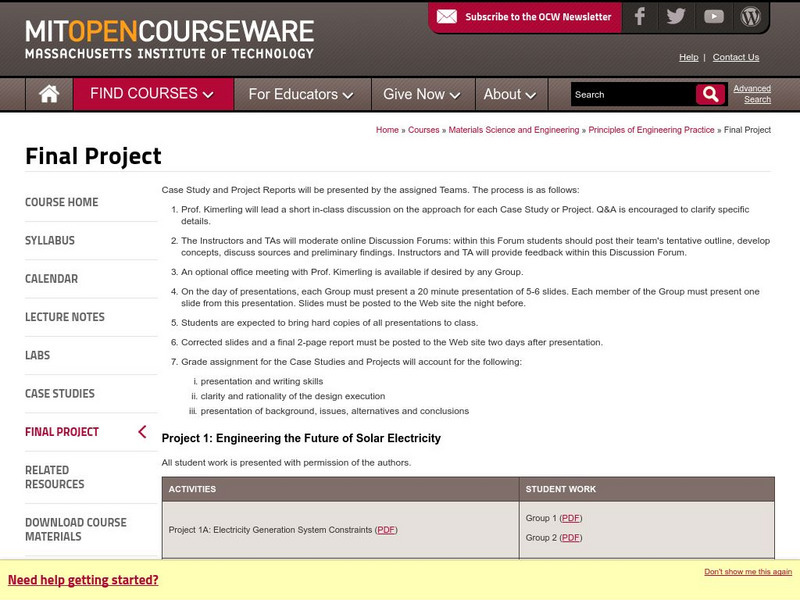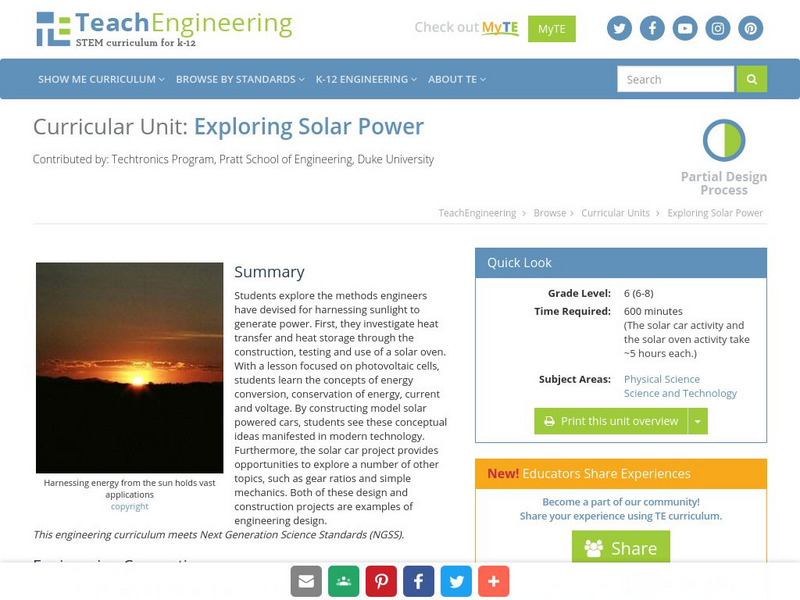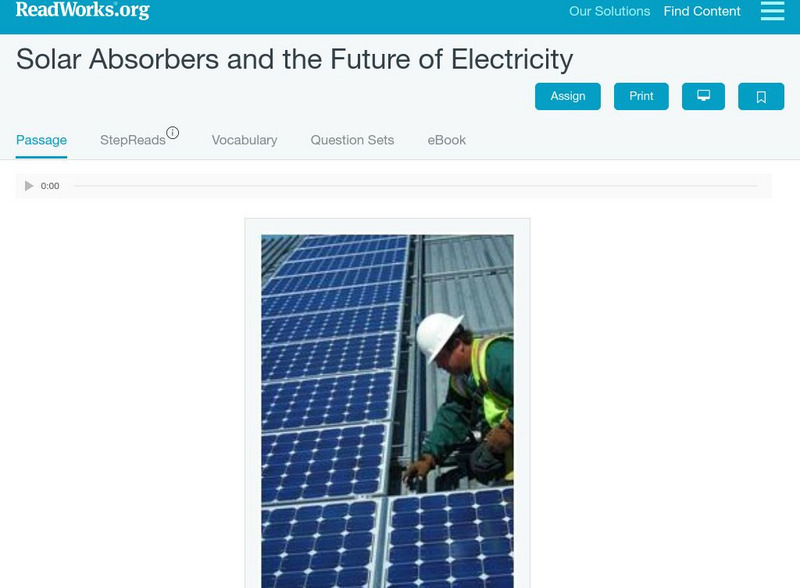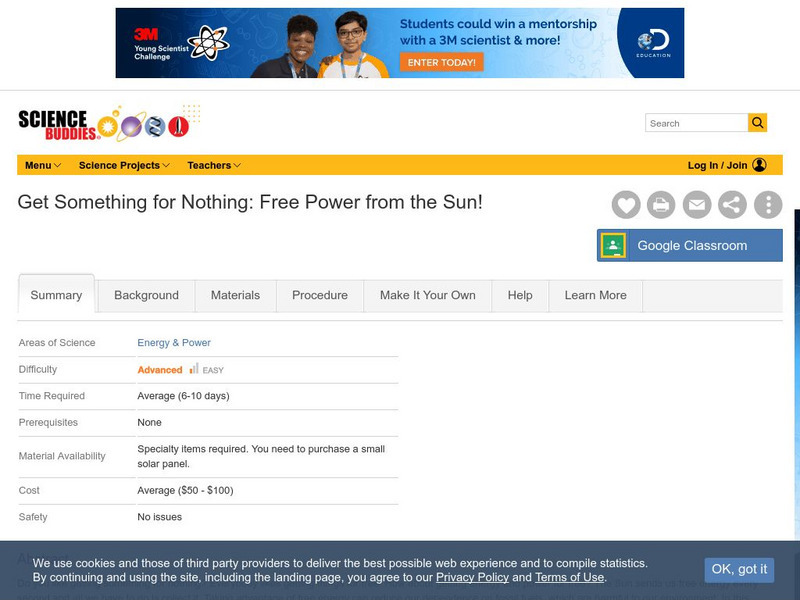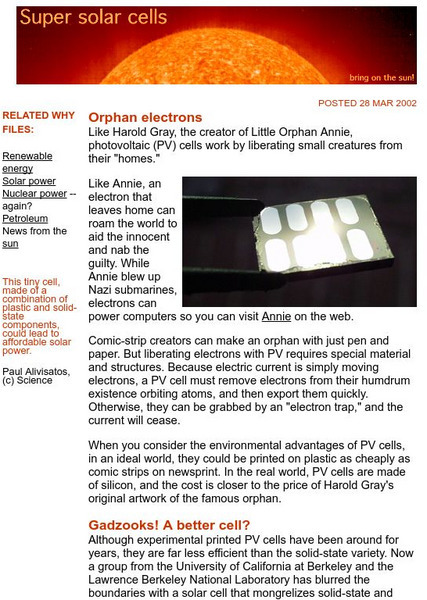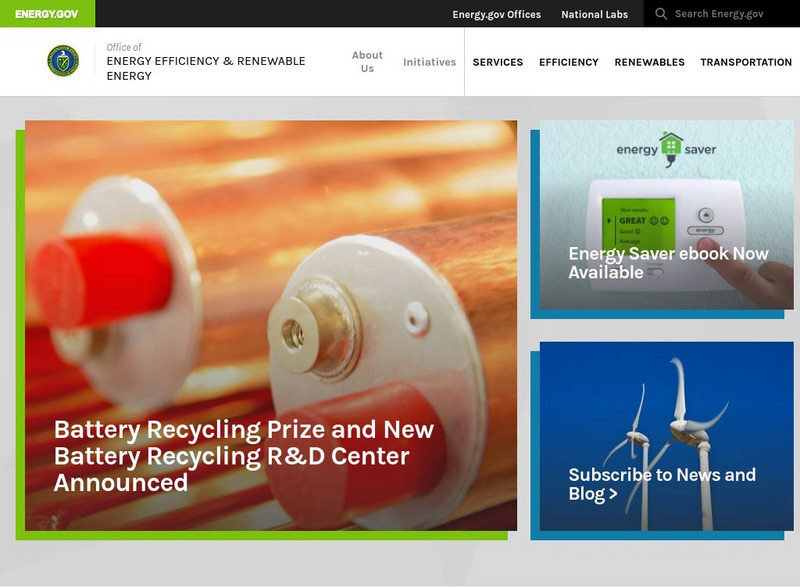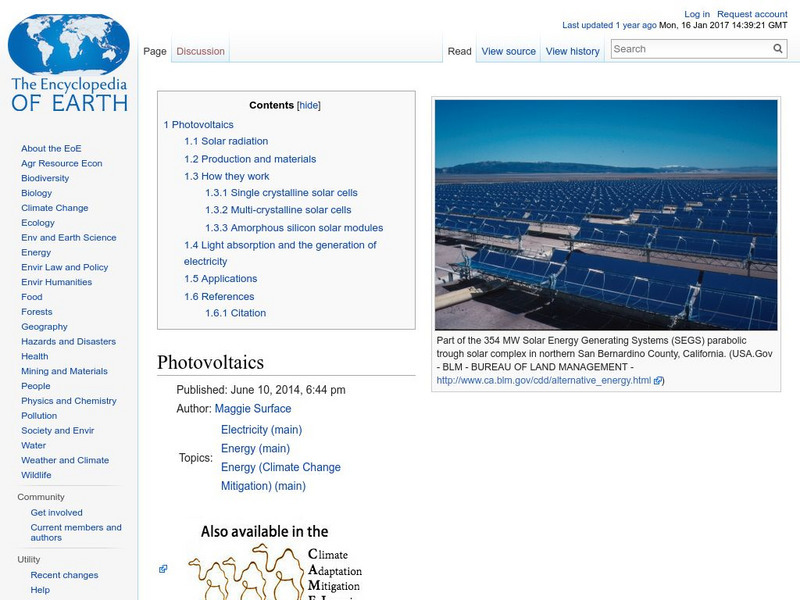Massachusetts Institute of Technology
Mit: Open Course Ware: Engineering the Future of Solar Electricity
Part of a materials science engineering course, a project through which students investigate the future of solar electricity by creating prototypes of solar cells. Students complete exercises in "project planning, analysis, design,...
TeachEngineering
Teach Engineering: Exploring Solar Power
This unit provides students the opportunity to explore methods engineers have devised for harnessing sunlight to generate power. Students will initially explore heat transfer and heat storage through the construction, testing, and...
TeachEngineering
Teach Engineering: From Sunlight to Electric Current
The instructional activity will first explore the concept of current in electrical circuits. Current will be defined as the flow of electrons. Photovoltaic (PV) cell properties will then be introduced. This will lead to the principle of...
TeachEngineering
Teach Engineering: Solar Power
In this activity, students learn how engineers use solar energy to heat buildings by investigating the thermal storage properties of some common materials: sand, salt, water and shredded paper. Students then evaluate the usefulness of...
PBS
Pbs: How Do Solar Panels Work?
We've seen them for years on rooftops, atop highway warning signs, and elsewhere, but how many of us know how solar panels actually work? How do the photovoltaic cells that lie at the heart of them turn sunlight ("photo") into...
US Department of Energy
U.s. Department of Energy: Energy Basics: Renewable Energy: Solar Energy
Find out about renewable energy resources using solar energy technologies. Learn about the use of photovoltaic cells and the capture of the sun's energy.
Read Works
Read Works: Solar Absorbers and the Future of Electricity
[Free Registration/Login Required] An informational text about solar panels being used to create electricity. A question sheet is available to help students build skills in reading comprehension.
Other
U.s. Department of Energy: Photovoltaics
This site has an overview of PV technology, impact, system application and design. Information is provided on how to select the best solar system for various needs.
Science Buddies
Science Buddies: Get Something for Nothing: Free Power From the Sun!
Taking advantage of free energy can reduce our dependence on fossil fuels, which are harmful to our environment. In this science fair project, you will work with a solar panel, which is a collector of free energy, and investigate how...
University of Wisconsin
The Why Files: Super Solar Cells
An understandable description of modern research that is currently being conducted to develop a more efficient photovoltaic (solar energy) cell. It also contains links to other pages on renewable energy sources.
Other
Flasolar: Solar Energy
An overview of practical uses of solar energy. Information and basic facts about solar energy use in homes and businesses. Covers the history, economics, and ecology of solar energy and includes pictures and schematics of solar technology.
Mocomi & Anibrain Digital Technologies
Mocomi: Solar Energy Facts
Explains what solar energy is used for and how it works, photovoltaic cells, and concentrated solar power.
Ducksters
Ducksters: Environment for Kids: Solar Energy
Kids learn about solar energy and how this renewable power can help the environment. Teach students about solar cells and using the sun for heat.
US Department of Energy
U.s. Department of Energy: Energy Efficiency and Renewable Energy
Access to information, policy initiatives, advice, and analysis on issues of energy efficiency and renewable energy, from the U.S. Department of Energy. Its network is responsible for tracking the technological, economic, and...
State Energy Conservation Office-Texas
State Energy Conservation Office: Learning About Photovoltaic Systems [Pdf]
Explains how photovoltaic systems work and how Texas homeowners are using them. Discusses how a homeowner can use solar energy and still be on the electricity grid system.
University of Wisconsin
The Why Files: Power Plants
Photovoltaic technology is compared and contrasted to the natural phenomenon of photosynthesis. The means by which photocells harness solar energy is described and explained.
Idaho State University
Global Wind Systems [Pdf]
A great description of the global scale circulation and heat energy. Discusses a single-cell model, a three-cell model, jet streams and more.
TeachEngineering
Teach Engineering: Do Different Colors Absorb Heat Better?
Students test whether the color of a material affects how much heat it absorbs. Students will place an ice cube in a box made of colored paper (one box per color; white, yellow, red and black), which they will place in the sun. The...
NASA
Nasa: Helios, the Solar Powered High Flyer
This site is an article on, "Helios can fly higher than any other airplane! And it uses only the Sun's energy for fuel!"
Encyclopedia of Earth
Encyclopedia of Earth: Photovoltaics
Article explaining what photovoltaic cells are, their role in solar energy, how they work, how electricity is produced, and applications of this technology. (Published: April 24, 2010)
University of Wisconsin
The Why Files: Positive Energy
A novel idea for converting solar energy to electrical energy. A brief discussion of solar energy collection in space via satellites.
Creative Science Centre
Creative Science Centre: Mini Light Beam Receiver
A very simple device to convert light into sound can be made by wiring a solar cell directly to headphones (or an earpiece). The solar cell converts light into electricity and the headphones convert electricity into sound. The limitation...
CK-12 Foundation
Ck 12: Earth Science: Global Wind Belts
[Free Registration/Login may be required to access all resource tools.] Describes how regional differences in solar radiation create global wind belts.
US Department of Energy
Us Dept of Energy:mining Silicon Througha Single Displacement/redox Reaction
Students will participate in a laboratory investigation that models the production of silicon. The activity investigates the sources, uses, properties, and importance in the fields of photovoltaics (solar cells/renewable energy) of silicon.


